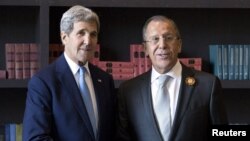Secretary of State John Kerry expressed U.S. concern about reports of Russia's enhanced military buildup in Syria in a telephone call Saturday with his Russian counterpart, the State Department said.
"The secretary made clear that if such reports were accurate, these actions could further escalate the conflict, lead to greater loss of innocent life, increase refugee flows and risk confrontation with the anti-ISIL coalition operating in Syria," the department said, using an acronym for the Islamic State group.
Kerry and Russian Foreign Minister Sergei Lavrov agreed that discussions on the Syrian conflict would continue in New York later this month, the department said.
The New York Times reported that Russia has sent a military advance team to Syria and was taking other steps that Washington fears may signal plans to vastly expand its military support for President Bashar al-Assad.
The Times reported the moves included the recent movement of prefabricated housing units for hundreds of people to a Syrian airfield and the delivery of a portable air traffic control station there.
Russian President Vladimir Putin said Friday that his country was providing "serious" training and logistical support to the Syrian army, the first public confirmation of the extent of Russia's involvement in the Syrian civil war.
Western governments and human rights groups have accused both Syrian government forces and those of the jihadist Islamic State group of large-scale human rights violations.
Putin said it was "premature" to discuss possible direct Russian involvement in military operations against IS in Syria, but that Russia was providing Damascus with "very serious support and equipment, and training of military personnel, weapons."
On Thursday, White House spokesman Josh Earnest said Washington was "closely monitoring" reports that Moscow had deployed military personnel and aircraft to Syria.
"Any military support to the Assad regime for any purpose, whether it's in the form of military personnel, aircraft supplies, weapons or funding, is both destabilizing and counterproductive," Earnest said.





